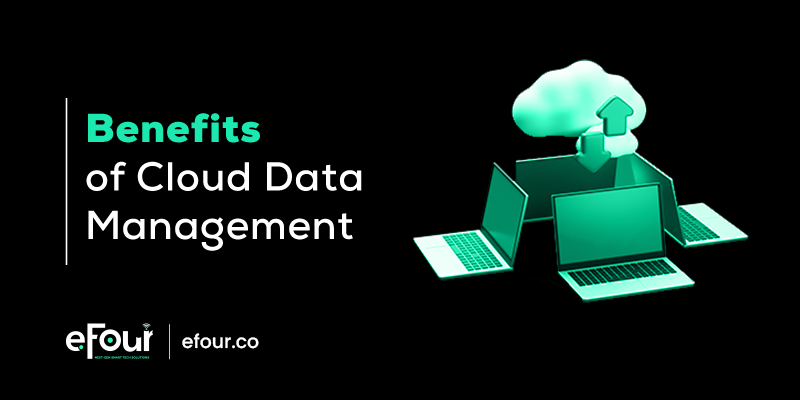
“Data is the new oil.” – Clive Humby.
In this new era of technology, data is everything for businesses. Data has become a valuable asset for every business regardless of the industry.
So, like every other valuable asset, you need to manage your data carefully. And, what can be a better way than cloud data management?
Wondering what it is?
Your curiosity has brought you are the right place. We will discuss every cloud data management in detail with its benefits and best practices.
So, without any further ado, let’s dive right in.
Table of Contents
What is Cloud Data Management?
Cloud data might look like a heap of chaos without proper organizing and sorting. Although the cloud provides enormous space to store your data, it also needs to be organized, especially when your business depends on it.
So, managing data on the cloud is the practice businesses follow to keep their cloud storage in check. It includes regular backups, disaster recovery plans, ease of access, security, and archiving.
Businesses all over the world realize the need to have a strategy for data management on the cloud, especially companies that depend on cloud-based apps and software. You don’t have to just store and manage your business data, but also manage app users’ data on the cloud.
Additionally, it brings many benefits to businesses that practice cloud data management.
So, if you think that “Great! But why do I need cloud data management services?” let’s discuss its benefits.
Benefits of Cloud-Based Data Management
As more businesses are using cloud technology to store and manage data, many proven benefits of cloud data management have come up.
So, here are just a few of the significant benefits.

Accessibility
Accessibility is one of the biggest benefits of having data on the cloud. Managing cloud data enables you to access data from anywhere at any time. And not only you, but you can also assign rights to your teammates for accessing the data. This way entire team can access the same data at the same time.
Moreover, the better you manage your data on the cloud, the easier it gets for you to take out the specific information you want.
This quick and anywhere accessibility of cloud data has made remote work possible for most businesses worldwide.
Security
As mentioned earlier, by managing who gets to access your data, the data gets secure. You can assign your teammates roles and restrict their access. Other than that, whenever there is an attempt to data breach or request to access the data by someone who does not have rights, you get notified in real-time.
There is no single device on which the data is stored. So, it is not like whoever gets their hands on the device can access the data. Whoever wants to access the data needs to request your permission.
Scalability
The more data you have, the better decisions you can make for your business. Thus, the excess is not poison, not when it comes to data.
And that is another benefit of cloud data you can store as much data as you want. The cloud provides you with next to unlimited data storage. Cloud data management eliminates the need to expand your office space just to accommodate the data.
Similarly, if you want to scale down the size of your data, you can do that with the cloud effortlessly. You don’t have to pay for the space you are not using.
Therefore, using cloud technology makes overall data scalability quite easy.
Disaster recovery
Losing data is a nightmare for any organization. Just imagine a fire broke out at your office; you will be most worried about the data you might lose after the people work there. You will not be as concerned about the devices as you would be about the data.
Thus, cloud data management allows you to recover information much easier than you would recover on-premise data. One of the best things about cloud data storage is that it gives a buffer time to recover the data even after you have deleted it, which is next to impossible for the on-premise data.
The other best way it helps with disaster recovery is through automated backups, which brings us to the next benefit.
Automated backup
Data backups are as necessary as routine maintenance of machinery. Backing up data secures you against all types of data losses. Therefore, cloud technology helps you take automated data backups.
If you have data stored in conventional methods, you would have to store the same data twice for backups which makes it more vulnerable to data security threats. Whereas, with the data on the cloud, you do not have to worry about storing your data at an alternative place.
Cost savings
Cloud data storage saves money in many ways. One of the most expensive costs that it totally eliminates is the cost to maintain and facilitate the on-prem data storage. You do not have to pay for space or electricity for storing data at your office.
Secondly, as discussed earlier, cloud storage is quite flexible; you do not have to pay for extra storage that you presently do not need. You can buy more storage simply when you need it.
Whereas the conventional data storage system requires you to pay for the space, you might need in the future.
Transparency
When working with a team, updating all the team members about every minute thing can be next to impossible in real-time. But not with cloud data. The entire team gets real-time data to stay on the same page.
Moreover, cloud data makes every process transparent, as the authorities can access the data from anywhere.
Let’s take a delivery business, for example. Whenever the delivery partner delivers the package, he/she updates the data in real time and the entire team gets updated about the delivery.
Automatic updates
Have you ever had to stop working because the IT person is updating everyone’s system? Well, that’s an issue you will never face if you manage data on the cloud. Cloud data storage providers update the services without the need to stop your work.
Integration
Data integration relieves you from the mundane data entry job. Once you have integrated a data cloud with an app, all its data gets automatically stored on the cloud. Besides that, as it supports various APIs, you can also help software and apps read your data without the need to interfere.
Especially cloud data management has made open new horizons for cloud-based applications. With such cloud apps, you can create an app for anything.
Alright! Now you know how beneficial cloud data management is. So, are you all ready to get your data management system already?
So, let’s discuss the best practices.
Best Practices for Data Management in the Cloud
Managing data in the cloud is way simpler than traditional data management. However, organizations face scenarios that make it complex. Thus, to avoid such situations, here are the best practices you can follow.
Define the objective
Before switching to cloud data organizing, you need to define what exactly your goal is. Do you want to store more data? Do you want it to make processes faster, more transparent, or more automated? These are the questions that you should be clear with.
Healthy data only
Uploading all the data to the cloud is not cloud data management. You must make sure that the data you store is healthy. And healthy means the data that is actually relevant to your organization. Ensure the data on the cloud is complete and verified. As many decisions depend on this data, your business might have to pay the price if the data is not relevant.
Protect your data
Cloud is not 100% secure. You need to back up your data regularly. Make sure the data is not accessible by anyone on the internet.
Cloud Data Management vs Conventional Data Management
Although the core of data management is the same for both, they still have a lot of differences too.
So, let’s talk about how cloud data management is different than conventional data management.
| Criteria | Cloud Data Management | Conventional Data Management |
| Scalability | High | Low |
| Anywhere access | Yes | No |
| Automatic Updates | Yes | No |
| Pricing | Pay as you go | Flat rate |
| Security | High | Low |
Other than this, cloud data management allows you to manage all the cloud databases from one system.
How efour Helps You with Cloud Data Management
efour has unparalleled expertise in cloud-based software development. So, we do understand how crucial it is to handle extensive data for organizations. And this is why we have come up with their cloud-based database solution.
Our database management system (DBMS) helps you access, sort, and manage your data in just a few seconds.
So, whether you are looking for cloud-based app development or cloud data management services, efour is the right place for everything related to cloud technology.

Use the quickest and easiest DBMS.
Contact efour and excel at managing your cloud data management with no effort.
Future of Cloud Data Management
Cloud technology is evolving every day, opening new possibilities. Most companies have shifted to managing their data on the cloud, and it is just the beginning. Soon the integration of cloud data to deploy IoT and AI in every business operation will not be surprising.
So, if you want to stay in the game, you should leverage cloud technology and be one step ahead of your competitors.
We hope this blog helps you to understand the concept of managing data over the cloud. Still, if you have questions unanswered, we have answered a few frequently asked questions. You might find your answers there.
FAQs
Here are the quick steps you should follow before choosing a cloud data management architecture.




